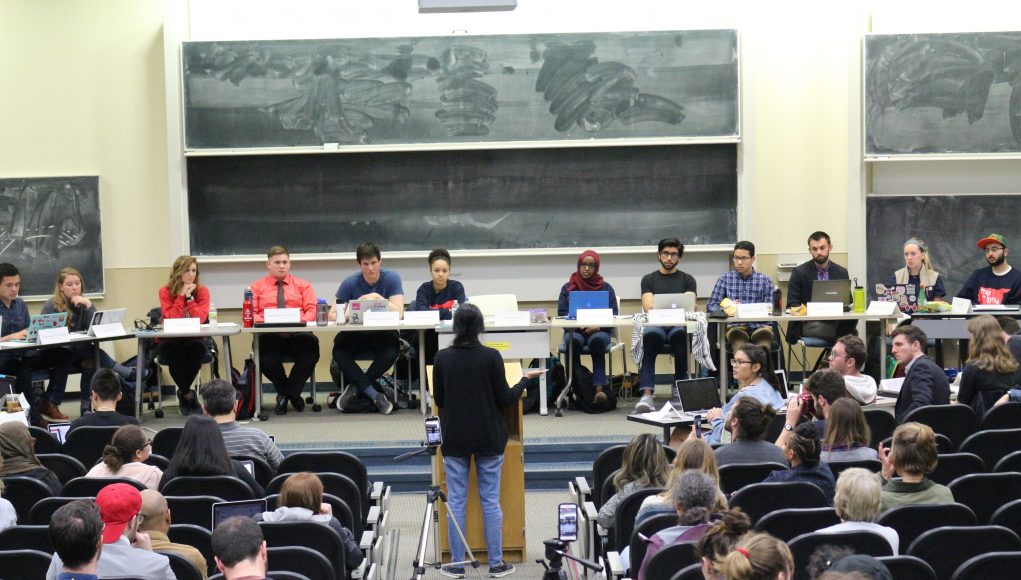 Students recently clashed over an Associated Students of Madison resolution demanding UW-Madison to divest from a wide range of companies, and some were rankled by the University’s response to the resolution’s passage.
Students recently clashed over an Associated Students of Madison resolution demanding UW-Madison to divest from a wide range of companies, and some were rankled by the University’s response to the resolution’s passage.
The Associated Students of Madison arranged an open forum on Wednesday, April 26th to discuss the bill and then vote on it.
The Divestment bill called for financial transparency from UW-Madison and more specifically, the UW Foundation, a private, nonprofit financial partner to UW. Along with that, the bill also calls for UW to end ties with companies listed in the resolution, including many banks such as US Bank and Wells fargo.
According to the resolution, these banks have “engaged in discriminatory lending practices that contribute to evictions, housing insecurities, and wealth inequality in low-income and minority communities.”

Not only so, but many other companies benefit from the oppression of black, brown, and indigenous communities in the United States. According to the one-page bill, Citibank, SunTrust, TD Securities, Deutsche and Wells Fargo banks fund the Dakota Access Pipeline.
This bill targets private prisons, fossil fuel corporations, border walls, and arms manufacturers that profit from human rights violations.
In regards to the transparency, there is a lack of access concerning UW Foundation’s $3.1 billion investment portfolio, according to the resolution. Although it is legal for the UW Foundation to privatize their information, their mission states that the UW Foundation provides opportunities to enhance its learning, research and outreach programs and guarantees ethical stewardship of gifts received.
The bill argues that although the UW Foundation states that gifts received are ethical, without proper access to the financial information, it is unclear whether what they’re saying is true.
During the open forum, many student organizations spoke out against UW-Madison. Some of the organizations also had a hand in creating the bill, like Students for Justice in Palestine, Chicano advocacy group MEChA, Wisconsin Black Student Union, and Native American grouip Wunk Sheek.
The divestment discusses the companies that profit from the oppression of black, brown and indigenous people in the United States, but also, it adds that Palestine suffers from the Israeli military through the same companies that have ties to the university.
Some Jewish students on campus spoke out against the bill because it targets the companies that have ties with Israel, and have called the bill anti-semitic. Nesha Ruther, a Jewish student, disagrees, and spoke in favor of the measure. She believes that since Judaism has such deep ties with social justice, it is important to stand up for people who are being oppressed, especially is they share the same land.
“I think as a Jew it’s really important to show solidarity with Palestinian immigration,” Ruther said. “Any institution or government that is actively occupying another person’s land, and limiting those people’s rights and mobility is inherently wrong to me.”
Ruther stayed at the meeting the whole time, and when the bill was passed unanimously, she was ecstatic. “I think for me being here, especially because I have a perspective that is not often represented in the Jewish community because it’s one that’s anti-Israel, it made me feel like me being here was effective. I was really really happy about it.”
Directly after the bill passed, the University sent out a statement in response. In this statement, the University said “The Associated Students of Madison’s Student Council is independent of the university administration. It does not control UW–Madison policies or practices and its actions tonight will not result in a change in our approach, or that of the WFAA, which is driven by its obligation to maximize the impact of a donor’s gift on the intended program in the university.”
Omer Arain, Shared Governance Chair for the Associated Students of Madison, thinks the statement was ready-made.
“It didn’t seem to acknowledge anything that was actually happening in the sense that it mentioned things that were not a part of the resolution” Arain said. “I think it’s inappropriate that the University commented on a student judicial proceeding.”
The statement also said that they have “heard clearly from the Jewish community how targeted they feel by the actions of the last month.”
Arain said that they only listened to a few Jewish students and campus, and not the ones who were in favor of the resolution. Not only that, but Arain expressed his disappointment with the timeliness of the statement.
“They sent out that response right away, but then when there are incidents for people of color on campus, there isn’t really a response or a statement sent out until people start freaking out wondering why they aren’t saying anything” Arain said.
Ruther also felt devastated by the response.
“The university hasn’t been there for Jewish students in the past when swastikas have been popping up all over the place, but now that it suits the University’s interests, they’re willing to support the Jewish people, which is super hypocritical and that’s antisemitism right there,” she said.
With the bill now passed, there is a demand from the students for some conversation to happen. It is uncertain where the next steps will take them, but the students now hope that badgering the University to actually speak up on these issues.
This piece was produced by a student in the Madison365 Academy. To learn more or support our educational programs, visit madison365.org/academy.




























